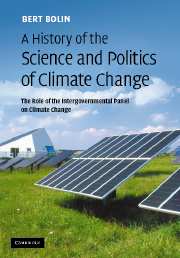 A History of the Science and Politics of Climate Change
A History of the Science and Politics of Climate Change Book contents
- Frontmatter
- Contents
- Foreword by Bo Kjellén
- Abbreviations
- Part I The early history of the climate change issue
- Part II The climate change issue becomes one of global concern
- Part III Are we at a turning point in addressing climate change?
- 12 Key scientific findings of prime political relevance
- 13 Climate change and a future sustainable global energy supply
- Some concluding remarks
- Notes
- References
- Name index
- Subject index
12 - Key scientific findings of prime political relevance
Published online by Cambridge University Press: 03 May 2010
- Frontmatter
- Contents
- Foreword by Bo Kjellén
- Abbreviations
- Part I The early history of the climate change issue
- Part II The climate change issue becomes one of global concern
- Part III Are we at a turning point in addressing climate change?
- 12 Key scientific findings of prime political relevance
- 13 Climate change and a future sustainable global energy supply
- Some concluding remarks
- Notes
- References
- Name index
- Subject index
Summary
The reality of a human-induced climate change is becoming more generally accepted. Preparations for adaptation have begun. The Kyoto Protocol has come into force, but no long-term agreement on mitigation has yet been reached.
The general setting
The early eagerness amongst politicians around 1990 to act in response to the threat of a human-induced climate change was largely genuine and in line with the increasing general attention that was given to environmental issues during much of the 1990s. There was, however, early reluctance from industry and other stakeholders to proceed quickly. They feared that action to protect the current climate, i.e. a reduction in the use of fossil fuels, might be a threat to their activities and admittedly the scientific basis for taking action was then hardly convincing.
Other major global issues, particularly many of a political nature, have since been brought into focus and have greatly influenced world politics, especially since the turn of the century. The conflicts in the Middle East to some considerable degree stem from a realisation that the global energy supply system might have to change during the coming decades. The conventional reserves of oil will dwindle within a decade or two and natural gas will begin to run out towards the middle of the century, while the global demand for energy will be increasing quickly, not least because of the rapid industrialisation in developing countries.
There is a need for trustworthy scientific information in order to find a common strategy between, on one hand, those that are giving priority to the short-term political security in today's society and, on the other, those that are anxious to safeguard the global environment and obtain a sustainable development emphasising the long-term issues.
- Type
- Chapter
- Information
- A History of the Science and Politics of Climate ChangeThe Role of the Intergovernmental Panel on Climate Change, pp. 195 - 213Publisher: Cambridge University PressPrint publication year: 2007
